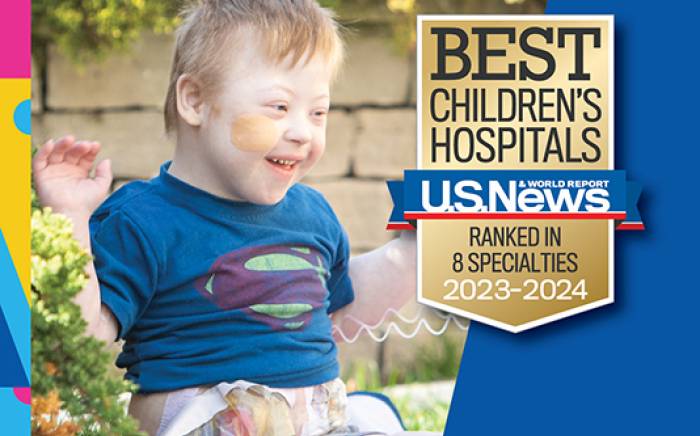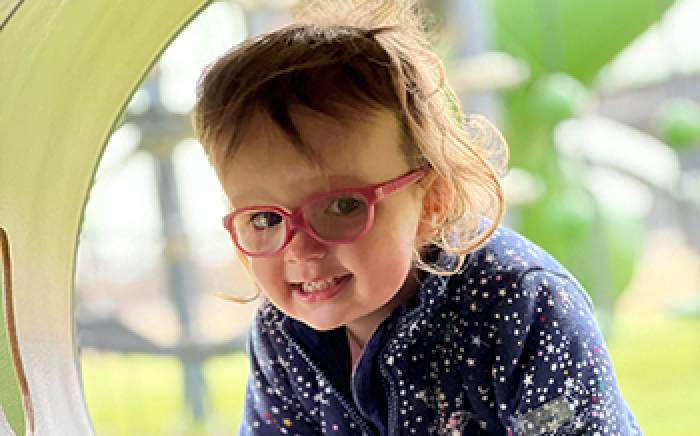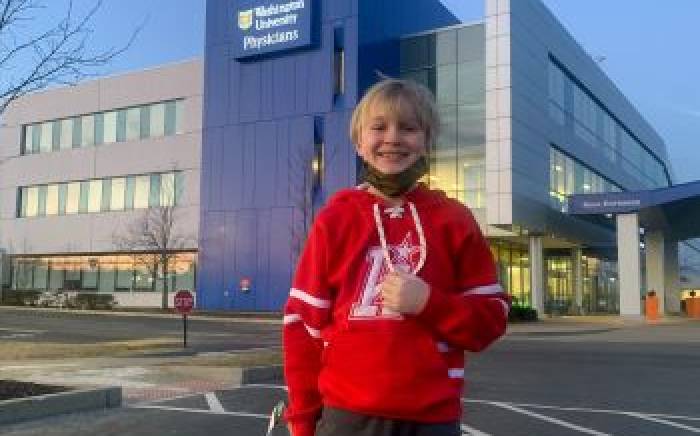 For more than two years, Mickie and David McCool searched for the reason their daughter, Ellie, once a seemingly healthy baby who achieved most of her developmental milestones on time, began regressing when she was about 12 months old. It wasn’t until Ellie was 3 ½ years old that Garrett Burris, MD, a pediatric neurologist then on the medical staff at Children’s Hospital and now at Baylor College of Medicine in Houston, gave them an answer.
For more than two years, Mickie and David McCool searched for the reason their daughter, Ellie, once a seemingly healthy baby who achieved most of her developmental milestones on time, began regressing when she was about 12 months old. It wasn’t until Ellie was 3 ½ years old that Garrett Burris, MD, a pediatric neurologist then on the medical staff at Children’s Hospital and now at Baylor College of Medicine in Houston, gave them an answer.
“Dr. Burris was the third pediatric neurologist we went to for a diagnosis. He told us he wanted to test for a disorder for which the gene had just been discovered. He said he was testing more to rule out the disorder rather than to rule it in,” says Mickie. “Unfortunately, the test proved that Ellie had Rett syndrome.”
By that time, Ellie had progressed from tapping her cheek with her fingers to hand wringing, and her communication skills had deteriorated to the point that the McCools weren’t certain of Ellie’s cognitive level.
“I thought she was as smart as other children—I could see it in her eyes—but it was as if she knew the world didn’t believe in her,” says Mickie.
As the McCools learned more about Rett syndrome, they recognized that Ellie was fully alert and present. They began treating her like the smart little girl she was, and Ellie learned to use her eyes to communicate her needs and understanding of the world. It was then that Mickie became a fierce advocate for Ellie living as full and normal a life as possible.
“No one in our school district with her level of disabilities had ever been fully integrated into the regular educational environment, but we fought to have her in those classrooms. At first our argument was that she was smart, but that is hard to prove for children with Rett syndrome because their intellect can’t be tested the same way as other children’s,” says Mickie, whose advocacy led her to active roles with the International Rett Syndrome Foundation, first as the Missouri regional representative and now as a member of the Family Empowerment Board. “Instead, our approach became the benefit to Ellie of experiencing how childhood friendships develop in school. And for her classmates, it was educating them about how people with disabilities can make a positive impact in their lives.”
From the time she entered kindergarten, Ellie’s time spent in regular classrooms rather than special education increased until by fifth grade she was fully integrated. Now 17, Ellie is a junior at Fort Zumwalt West High School. A one-on-one assistant facilitates her ability to learn and answer questions through her eye gaze.
“The more Ellie was included in the regular classrooms, the better she did in school. It was gratifying to watch as the principals, teachers and staff came to understand Ellie’s potential and drew inspiration from her,” says Mickie. “And she’s developed the long-term friendships we wanted for her. These are friends who will be there for her in the years to come because Ellie is one of them.”
Now using a wheelchair, Ellie has undergone surgery for severe scoliosis and takes medication for seizures that began when she was 14. She also takes medication for carnitine deficiency and vitamin supplements. The complexity of Ellie’s medical care is why the McCools describe the Rett Spectrum Clinic at St. Louis Children’s Hospital and Washington University School of Medicine as the answer to their prayers.
"We really did pray for a clinic, as did our relatives, friends and even a group of nuns I met on a retreat,” says Mickie. “Our dream was to have one place where all the doctors possessed a true understanding of this debilitating disorder, and where in one day we could talk with all the experts Ellie needed. For us, the first miracle was Drs. Ryther and Weisenberg’s interest in Rett syndrome. The second was their establishing the Rett Spectrum Clinic at the world-class institutions of Children’s Hospital and Washington University.”
The third “miracle” came when a member of the McCools’ church organized the first of a planned annual “Golf for Ellie” scramble, which in its first year raised $40,000 in support of Rett syndrome.
When the clinic opened on January 30, Ellie was one of the first patients seen. Her ongoing care will include acquiring and learning to use a computer with eye-gaze technology, a device that will allow Ellie to fully communicate her thoughts for the first time in her life. The McCools can’t wait for those conversations with their daughter.









